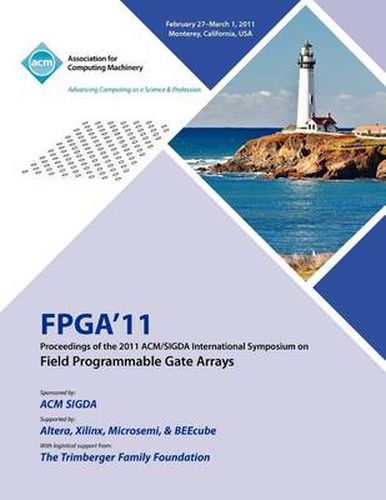Readings Newsletter
Become a Readings Member to make your shopping experience even easier.
Sign in or sign up for free!
You’re not far away from qualifying for FREE standard shipping within Australia
You’ve qualified for FREE standard shipping within Australia
The cart is loading…






This title is printed to order. This book may have been self-published. If so, we cannot guarantee the quality of the content. In the main most books will have gone through the editing process however some may not. We therefore suggest that you be aware of this before ordering this book. If in doubt check either the author or publisher’s details as we are unable to accept any returns unless they are faulty. Please contact us if you have any questions.
The ACM/SIGDA International Symposium on Field-Programmable Gate Arrays is the premier conference for presentation of advances in all areas related to FPGA technology. For FPGA conferences, we solicit original submissions describing novel research and developments in the following (and related) areas of interest: * FPGA Architecture: Novel logic block architectures, combination of FPGA fabric and system blocks (DSP, processors, memories, etc.), design of routing fabric, I/O interfaces, new commercial architectures and architectural features. * FPGA Circuit Design: Novel FPGA circuits and circuit-level techniques, impact of process and design technologies, methods for analyzing and improving issues with soft-errors, leakage, static and dynamic power, clocking, power grid, yield, manufacturability, reliability, test; studies on future device technologies (e.g. nano-scale, 3D gate) for FPGAs. * CAD for FPGAs: Placement, routing, retiming, logic optimization, technology mapping, system-level partitioning, logic generators, testing and verification, CAD for FPGA-based accelerators, CAD for incremental FPGA design and on-line design mapping and optimization, CAD for modelling, analysis and optimization of timing and power. * High-Level Abstractions and Tools for FPGAs: General-purpose and domain-specific models, languages, tools, and techniques to facilitate the design, development, debugging, verification, and deployment of large-scale and high-performance FPGA-based applications and systems e.g. DSP, networking or embedded system tools and methodologies. * FPGA-Based and FPGA-like computing engines: Compiled accelerators, reconfigurable computing, adaptive computing devices, systems and software, rapid-prototyping. * Design Studies: Innovative uses of FPGA fabric for computation, exploitation of FPGA features and architectures, optimization of FPGA-based cores (e.g. arithmetic, DSP, security, embedded processors, memory interfaces, or other functions). * Applications: Implementation of designs on FPGAs to achieve high-performance, low-power, or high-reliability. Novel design algorithms which take advantage of FPGA features. Application-domain studies to analyze or improve FPGA implementation for networking, DSP, embedded, audio/video, automotive, imaging and other relevant areas
$9.00 standard shipping within Australia
FREE standard shipping within Australia for orders over $100.00
Express & International shipping calculated at checkout
This title is printed to order. This book may have been self-published. If so, we cannot guarantee the quality of the content. In the main most books will have gone through the editing process however some may not. We therefore suggest that you be aware of this before ordering this book. If in doubt check either the author or publisher’s details as we are unable to accept any returns unless they are faulty. Please contact us if you have any questions.
The ACM/SIGDA International Symposium on Field-Programmable Gate Arrays is the premier conference for presentation of advances in all areas related to FPGA technology. For FPGA conferences, we solicit original submissions describing novel research and developments in the following (and related) areas of interest: * FPGA Architecture: Novel logic block architectures, combination of FPGA fabric and system blocks (DSP, processors, memories, etc.), design of routing fabric, I/O interfaces, new commercial architectures and architectural features. * FPGA Circuit Design: Novel FPGA circuits and circuit-level techniques, impact of process and design technologies, methods for analyzing and improving issues with soft-errors, leakage, static and dynamic power, clocking, power grid, yield, manufacturability, reliability, test; studies on future device technologies (e.g. nano-scale, 3D gate) for FPGAs. * CAD for FPGAs: Placement, routing, retiming, logic optimization, technology mapping, system-level partitioning, logic generators, testing and verification, CAD for FPGA-based accelerators, CAD for incremental FPGA design and on-line design mapping and optimization, CAD for modelling, analysis and optimization of timing and power. * High-Level Abstractions and Tools for FPGAs: General-purpose and domain-specific models, languages, tools, and techniques to facilitate the design, development, debugging, verification, and deployment of large-scale and high-performance FPGA-based applications and systems e.g. DSP, networking or embedded system tools and methodologies. * FPGA-Based and FPGA-like computing engines: Compiled accelerators, reconfigurable computing, adaptive computing devices, systems and software, rapid-prototyping. * Design Studies: Innovative uses of FPGA fabric for computation, exploitation of FPGA features and architectures, optimization of FPGA-based cores (e.g. arithmetic, DSP, security, embedded processors, memory interfaces, or other functions). * Applications: Implementation of designs on FPGAs to achieve high-performance, low-power, or high-reliability. Novel design algorithms which take advantage of FPGA features. Application-domain studies to analyze or improve FPGA implementation for networking, DSP, embedded, audio/video, automotive, imaging and other relevant areas